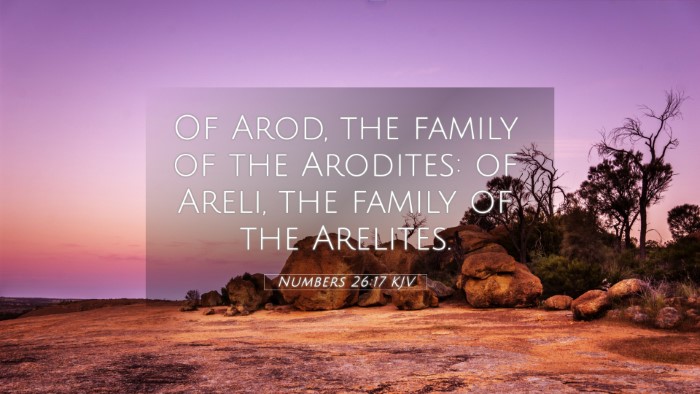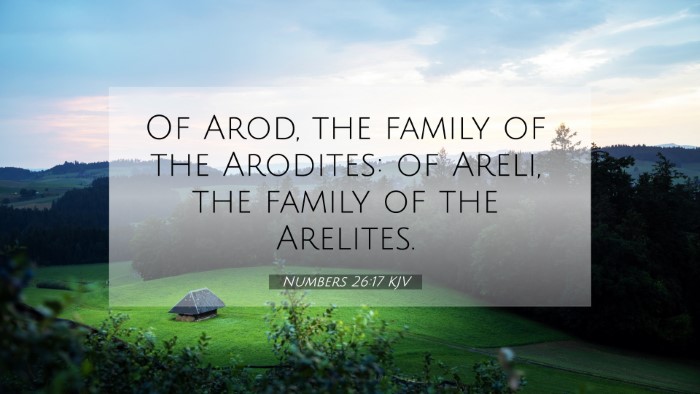Numbers 26:17 states: "And these are the families of the Reubenites: and they that were numbered of them were forty and three thousand and seven hundred and thirty." This passage is part of a census conducted shortly before the Israelites were to enter the Promised Land, and it provides insight into the organization and ancestry of the tribes of Israel, particularly the tribe of Reuben.
Meaning and Interpretation
The essence of Numbers 26:17 lies in its context within the larger structure of the Book of Numbers. This book provides a record of the Israelites' wanderings, their preparation for entering Canaan, and their demographic account as they approached the land God promised to their ancestors. The numbering of the tribes signifies God's faithfulness in preserving the descendants of Israel and the importance of each tribe's contribution to the overall community.
The mention of the families and their numbers serves several purposes:
- Genealogy and Inheritance: Each family plays a crucial role in the narrative of inheritance in the land of Canaan. The descendants of Reuben, being the firstborn, had a significant position among the tribes.
- Identity and Community: The naming and counting of families emphasizes the identity of the Israelites as a chosen people, distinct and set apart for God's purposes.
- Fulfillment of Promises: This census reflects the fulfillment of God's promise to multiply Abraham's descendants. It underscores the reality that, despite their difficulties, the people of Israel continued to thrive.
Insights from Public Domain Commentaries
Matthew Henry provides commentary on this verse, highlighting the significance of the tribe of Reuben. He notes that their numbers, while substantial, are less than those of other tribes, demonstrating both the grace of God in maintaining a remnant and the effect of their past choices, particularly those of Reuben, who lost his birthright due to his transgression (Genesis 49:4).
Albert Barnes expands on the implications of the census. He points out that the Reubenites had not only their families counted but that this act served to prepare them for warfare—a necessary step before embarking into the Promised Land, aligning with the military structure needed for conquest.
Adam Clarke provides additional context regarding the tribal listings. He emphasizes that these censuses were integral for organization and planning, forming a basis for later allocations of land and responsibilities assigned to each tribe in their conquest and settlement of Canaan.
Bible Cross-References
This verse can be cross-referenced with several passages in both the Old and New Testaments that illustrate family lineage, tribal responsibilities, and God's faithfulness:
- Genesis 49:3-4: Jacob's prophecy about Reuben losing his position as firstborn.
- Numbers 1:20-23: The initial census of the Israelites, emphasizing the Reubenites' earlier count.
- Joshua 13:15-23: The allocation of land to the tribe of Reuben.
- 1 Chronicles 5:1-2: Discusses the genealogy of Reuben and their heritage.
- Hebrews 11:32-34: Acknowledges the faith of Israel's leaders during military campaigns.
- Acts 2:39: Highlights the promise of salvation under the lineage of Israel, reiterating God's commitments.
- Romans 9:4-5: Discussing the privileges of Israel, including genealogical significance.
Thematic Connections
Numbers 26:17 is thematically connected to several broader Biblical themes, reflecting the intricate tapestry of Biblical texts:
- Divine Promises: This verse emphasizes fulfillment in the lineage of Israel, connecting to Genesis with God’s promise to Abraham.
- Identity and Community in Faith: As each tribe is numbered, the importance of belonging to a covenant community is highlighted (Exodus 19:5-6).
- Judgment and Grace: The numerical decline relative to past counts suggests the need for grace despite past failures (Ezekiel 37:25).
- Covenantal Theology: Each census calls believers to reflect on their place within God’s redemptive history (Jeremiah 31:31-34).
Using Cross-References in Bible Study
Understanding Numbers 26:17 can be enhanced through the use of effective cross-referencing tools. Some suggestions for enriching your study include:
- Bible concordance: Utilizing a concordance can help quickly identify related verses and themes.
- Cross-reference Bible study guide: Following a structured guide improves understanding and retention of how verses interconnect.
- Bible chain references: Linking verses thematically can help build a cohesive narrative throughout Scripture.
- Comprehensive Bible reference resources: Using multiple resources broadens insight and context, particularly for genealogical studies.
Conclusion
In summary, Numbers 26:17 serves as a vital link in understanding the history of the Israelites as they prepare to claim God’s promises. It invites us to examine not only the significance of each tribe and family but also to connect this moment with the broader narrative of Scripture that showcases God's enduring faithfulness and grace. For anyone engaging in thematic Bible verse connections, and inter-Biblical dialogue, this verse provides rich ground for study and reflection.



